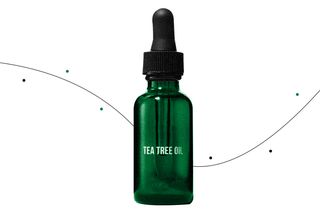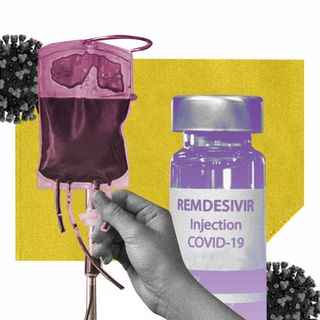
Untrending: Tea Tree Oil Only Has Minor Anti‑Bacterial and Anti‑Septic Benefits
If used frequently or in large amounts, tea tree oil can damage skin, causing contact dermatitis.

In Untrending, we side-eye the latest fads so we know what we’re getting ourselves into — and what (if anything) we’re getting out of them.
Everybody has a tea tree oil story. For some, it zapped acne, for others it culled dandruff, and for a select (deluded) few, it was a home remedy to end lice infestations. Tea tree oil is one of the most popular ‘essential’ oils — the group of liquid compounds extracted from plants that retain their scent, flavor, and efficacy — the very ‘essence’, in short.
These oils, previously used to scent and flavor foods or as fringe herbal remedies, became wildly popular due to rising public and celebrity interest in aromatherapy, a form of holistic healing treatment that involves infusing an area with the scent of essential oils — it could be for yourself (beauty products) or your room (diffusers, incense, and more). From Gwyneth Paltrow and Ke$ha to Miranda Kerr, aromatherapy received sparkling endorsements, propelling essential oils from offbeat herbal remedies to a mainstream alternate healing therapy.
The tea tree’s (Melalauca alternifolia) reputation as “nature’s first aid tree” helped cement its position as one of the most popular essential oils to purchase. Tea tree oil, according to popular wisdom, can treat anything from acne to athlete’s foot to dandruff to herpes lesions to warts to insect bites to ringworm — the list feels endless. Its most popular usage till now, however, has been as a skin and hair care product.
Some of these benefits are scientifically valid. There is positive research and expert opinions around tea-tree oil’s efficacy as an anti-inflammatory agent. Several studies show that it can help clear hormonal or cystic acne due to its anti-microbial and anti-inflammatory abilities — to the point where five percent of a tea tree oil solution works as well as five percent of benzoyl peroxide, a popular medication for treating acne.
This anti-microbial ability is also valuable in cleaning wounds and insect bites: research shows tea-tree oil helps soothe inflammation caused by these bites and prevents further bacterial infection. Some research also proves that tea-tree oil’s anti-fungal abilities can help treat dandruff — research showed that individuals with tea-tree oil shampoos had better dandruff reduction than those using placebos (a treatment with no therapeutic value). It is important to note that allopathic medicine still works better than tea-tree oil, with the latters’ effects and benefits being marginal in comparison to the former.
Related on The Swaddle:
Untrending: Juicing Is Worse Than Useless
Research on tea tree oil’s other superpowers remains limited. A study claimed that tea-tree oil can treat athlete’s foot — a contagious fungal infection on the foot, hands, and nails — better than a placebo. But, as Dr. Ethan Ciment, a podiatrist, tells Repeller, “There is no evidence-based, peer-reviewed scientific study that shows that tea tree oil eradicates fungal infections in nails on living patients. Many patients will find that the nails will improve in their appearance and the nails will soften so that they’re easier to trim. Still, in each case I’ve seen, the moment they stop using the tea tree oil, the appearance of the nail reverts to the way it was before.”
Some research suggests that tea tree oil can help aid psoriasis treatment, but that seems to be in theory only. Similarly, others suggest that tea-tree oil may work as a natural deodorant, but research has not backed up the same yet. There are also lofty claimsabouttea tree oil’s ability as a natural hand-sanitizer — but the oil isn’t as effective as the stronger alcohol variants that can kill several types of bacteria, viruses, and fungi.
There’s no harm in trying tea-tree oil as a natural remedy because it is rated mostly safe, except that high concentrations of tea tree oil can cause contact dermatitis and rashes. In plain English — Tea-tree oil, an anti-inflammatory compound, can also cause allergic inflammation in some cases. Therefore, it is important to test the oil on a small patch of skin on your arm 24 hours before using the oil as a remedy on your face, scalp, or body.
Another problem that arises while sourcing tea-tree oil is that it is very difficult to tell the difference between real and fake tea tree oil; the latter has synthetic variants that can worsen dandruff, dermatitis, or even skin burns if used instead of real tea-tree oil. This means it is important to make sure you buy tea-tree oil from a trusted source and do research to ensure that the manufacturers utilize pure tea-tree oil only.
TLDR? Tea-tree oil, if pure and in the right concentration, is harmless to use. It will show legitimate results if you use it on acne. For the rest, use real medication for real results.
Aditi Murti is a culture writer at The Swaddle. Previously, she worked as a freelance journalist focused on gender and cities. Find her on social media @aditimurti.
Related


Remdesivir, Plasma Therapy Are Not The Best Treatments for Covid19. So Why Are Indians Desperate To Procure Them?
